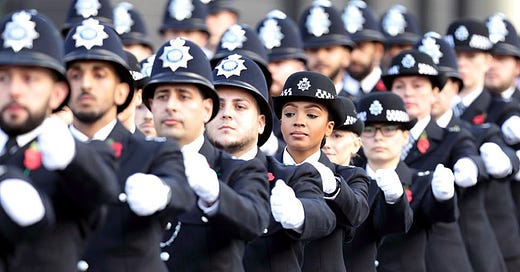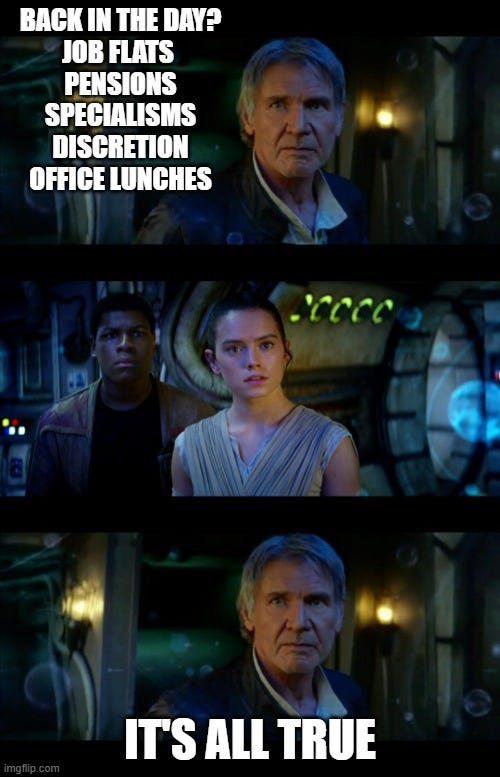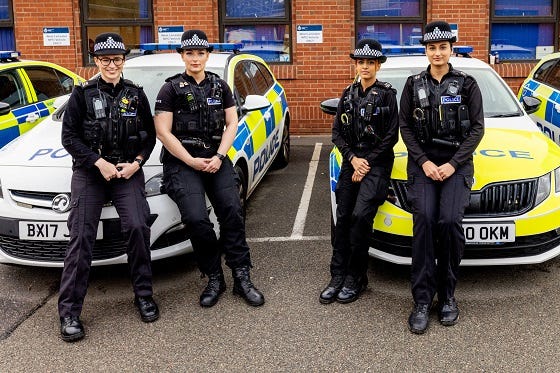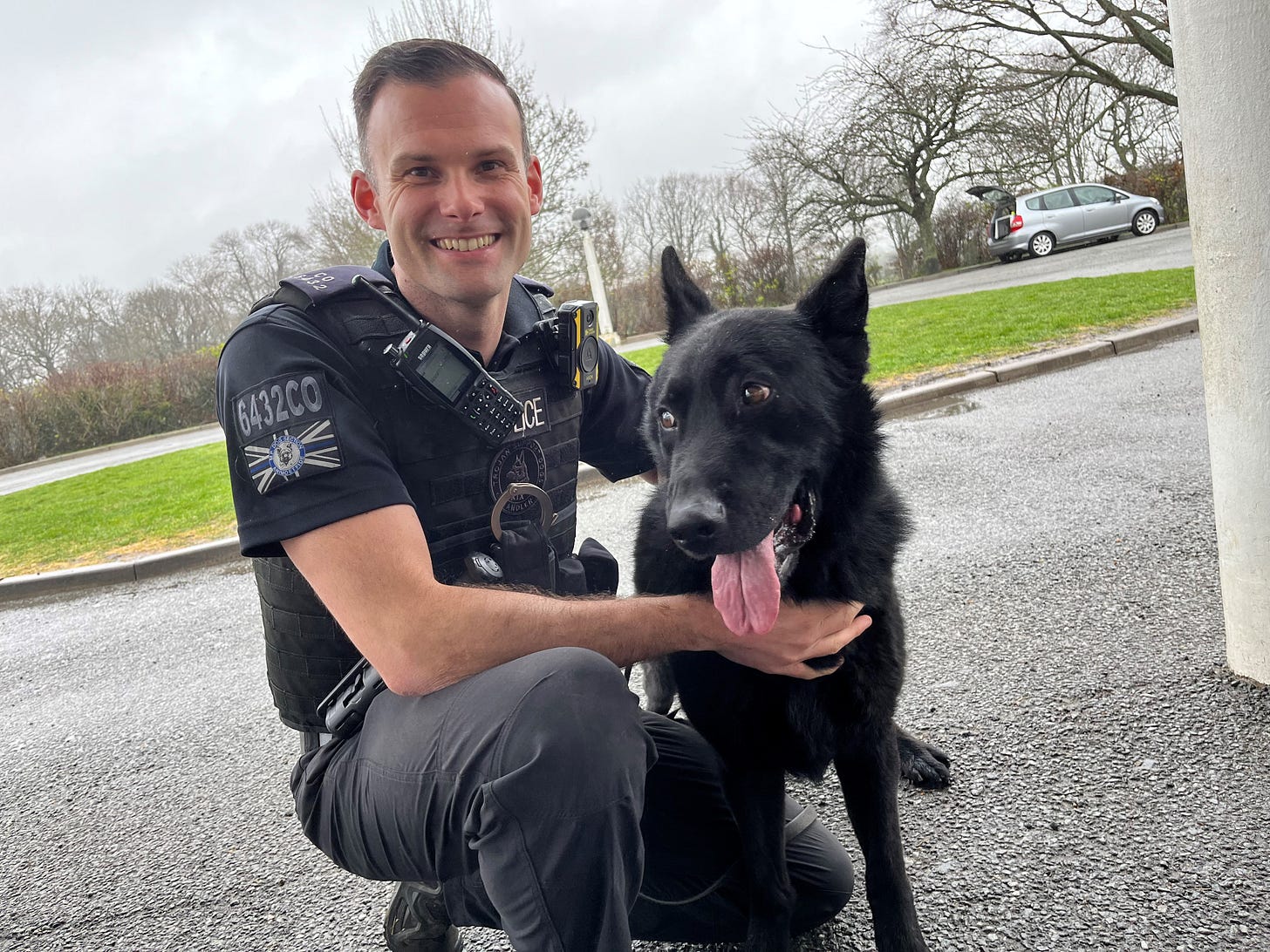New Met Police recruits. Bless ‘em.
I’m occasionally asked my advice on joining the police (me!) by young people. I usually grumble and suggest they do something else. They say the police force you leave is never the one you joined; this was certainly my experience. Will the Job ever recover from Theresa May’s orgy of destruction? My views are a matter of record; the dire state of British policing is the main theme of this Substack, after all.
Yet I’m still asked the same question: should I join the police? And people do still join. Which is a relief; whatever you think of the Old Bill, you wouldn’t want to live in a country without any. But I wouldn’t be doing would-be coppers any favours by sugar-coating the police pill. They’d only join, get disillusioned, then quit.
So, here’s my FAQs about joining the police. It’s a long read, because it’s a big decision. You might want to dip in and out of it.
Please note, I’m not covering police selection or training. I doubt I’ve much to offer. This piece offers food for thought on joining the police in the first place, and what to expect once you get there.
For what it’s worth? This is the advice I’d give my kids.
Some context: Policing as a career: then and now
Then
When I joined the police, in the early 90s, the deal was straightforward: you were paid a half-decent, but not spectacular, salary. If you kept your nose clean, you’d retire thirty years later. Assuming you didn’t go mad, suffer a serious injury, develop an out-of-control drink problem or get caught doing something heinous, you retired at an agreeably young age (for most people this would be their early fifties). You would draw a 2/3rds final salary pension and a commutation as a lump sum.
There was no shortage of recruits. Older joiners, especially, were able to choose policing as a viable second career (the average age in my training school class was about 24, the oldest being 45). In fact, people leaving the Job voluntarily caused raised eyebrows.
Those days are gone.
Right, enough nostalgia, eh?
Now
The police reform strategy, implemented from 2013, was designed to break a ‘job for life’ mentality the government claimed hindered police culture and performance. People should dip in and out of policing to gain experience beyond coppering (which they might take back with them, as and when they re-entered the service). The pension was reduced to a shadow of its former self (although not terrible), with the retirement age increased to sixty. This remains a very, very sore point; many officers found the pension they signed up for when they joined changed to their detriment. The salary (you’ll be shocked to hear) was frozen, officers taking the equivalent of a near-20% pay cut over a decade. Reform, indeed, eh?
To improve diversity, the powers-that-be also wanted people to join at different ranks and in different roles. Thus direct entry for detectives and senior officers. There were also multiple entry points for constables, including as undergraduates and apprentices. This idea of a modular career, one where ‘churn was good’ (Narrator’s Voice - but the churn wasn’t good) was really camouflage for Tory austerity measures. The reforms were, frankly, a dog’s breakfast.
That’s where we are now. So why on earth would you sign-up? Assuming a person is joining in good faith, I’d suggest three primary motivators; recruits usually have a smidgeon of each.
Vocational: I won’t use the word idealistic, although there might be an element of this. You might be simply one of those people drawn to the Job, for reasons both stoic, romantic and / or delusional. Or you might come from a police family. Such individuals are the backbone of policing. This is noble and decent, but beware; I’ve seen vocational coppers have every last drop of goodwill wrung out of them by careerist managers.
Experiential: These people are often slightly older and ‘want to do something different.’ They don’t want an office 9-5 (if that still happens). Experiential recruits tend to be more open-minded. They sometimes end up in unusual or niche roles. They also run the risk of quickly becoming disillusioned with the sheer mundanity of workaday policing and bone-headed management. For every car chase, interesting crime or hair-raising encounter, there’s HOURS of boredom and drudgery.
Strategic: The strategist has a plan - get in, get skilled-up, leave. Anyone thinking of joining the police, especially nowadays, might do worse than adopt such a transactional mindset. Joining primarily to acquire skills sought after in the private sector? Strategists will be the least likely to be disappointed by policing. It’s similar to the old ‘learn a trade’ ethos of the armed services. Policing can offer excellent, difficult-to-obtain qualifications in financial investigation, computer forensics and a host of private sector intelligence / investigative / regulatory roles. Being a total mug, I absolutely wasn’t one of these people.
Promotion
I haven’t mentioned those ambitious souls interested in promotion. Which, nowadays, is a career path in and of itself. I’ll return to this later, but because I left at the rank I joined (a constable - ‘detective’, incidentally, isn’t a police rank), I’m not the best person to ask. Anyway, this FAQ isn’t really for ‘LinkedIn Coppers’.
Vocational, experiential or strategic? Student constables from the BBC3 documentary, ‘Fresh Cops.’
Frequently Asked Questions
What’s it like being a new police officer?
We’ve all heard stories of how, allegedly, cosseted young people are joining the police without realising;
It’s a 24/7 service. You have to work antisocial hours: Nights. Weekends. Public holidays.
There’s confrontation. Violence. Etc. People will tell you, on a near-daily basis, how they hope you die of cancer.
You have to take orders, occasionally from people you don’t like. But you have to follow them anyway.
No, you can’t WFH. Well, not yet. There are cushy, arse-polishing HQ roles where you can perform the laptop / PJ tango, but first you need to do your two years on response.
If any of the above troubles you either (a) don’t join, or (b) become a direct-entry superintendent. In addition to crappy hours, strange shift patterns, cancelled rest days and the occasional ‘bit of the old ultraviolence’, you should also expect the following;
You’ll be thrown in at the deep end; nowadays, most of your colleagues will have less than five years service. Now you know, you can prepare; take your training seriously, even if it’s a load of distance-learning shit. Understand the law. Know your powers. Listen to those people who are more experienced than you.
Police don’t get much sympathy from the public, the media or management. This means you have to rely on your team, who may well become a dysfunctional, occasionally cultish, second family. The first time you step into your police station, you ARE being judged; this isn’t Tesco. fuck-ups can be safety-critical and / or job-threatening. So do some discreet judging in return. It’s like the first day at school. Don’t buddy-up with the cool kids unless it looks like the cool kids know what they’re doing.
Self-care is a big thing with Gen ‘Z’, in a way it really wasn’t with Gen ‘X’. We had booze, pub lock-ins, dark humour, canteens and ‘999’ parties where we could try and pull nurses (although, obviously, firefighters were first in the queue). So look after yourself. It’s not for me to tell you how. All I’ll say is, if you don’t have a self-care strategy? Get one.
A good rule of thumb for dealing with the public; expect everything you say and do to be videoed and posted on YouTube. This doesn’t mean being a robot. In fact, if you’re clever, you can have fun with it.
Don’t be precious. Make the tea. Take the shit jobs. Eat humble pie. Fess up to mistakes. This doesn’t mean letting people take you for a mug, or bully you. It simply means knowing how to play the game. Also, taking shit jobs is how you learn your trade. People will notice if you’re putting in the hard yards.
The only equipment you’ll need to provide nowadays is a watch and a pen (I’m often asked questions about kit). I suggest you buy a tough, easy-to-read digital so you know the day, date and time for reporting purposes. I know younger people rely on mobiles, but at a multi-vehicle pile-up it’s easier to glance at your wrist than dick around with your iPhone, which you’ll then drop inside a burning Tesla or whatever.
Even if it’s your thing, try giving the whole ‘bring yourself to work’, intersectional bullshit a rest. It’s about as trendy as wearing Crocs. We’re all bored of it, including the vast majority of the general public who ultimately pay your not-very-competitive wages. You’re the police, FFS, not a walking social media platform. You are above trifling concerns. If you can’t manage this, join as a direct-entry superintendent.
If you can’t take a joke, you shouldn’t have joined.
What are car chases like?
Fucking awesome.
Will there be dealing with dead people?
Yes. I wrote about it here, young padawan.
Should I join as a direct-entry detective?
A very good question.
They introduced direct entry into CID just as I was leaving the Police, but I know people who’ve done it. Guess what? Most of them preferred uniform, with more than a few actually transferring to response duties full-time.
Why? Because, I suspect, too many trainee detectives are given ridiculous caseloads in risk-critical areas without proper support. Especially in roles involving safeguarding and sexual offences.
Response? You go to different calls every shift. You don’t have such a huge caseload. The team dynamics are different. You’re outside a fair bit. Now, I decided from day one I was never going to be a career uniformed officer. Nor did I enjoy all of it. Nonetheless, uniform policing was one of the most important and formative experiences of my adult life. I would bitterly regret not having done it.
Want to be a detective? Great. I did it myself. I just think it’s better to learn how to be a copper first. Then again, if you’re the type of strategist I mentioned at the beginning of this piece? Direct-entry CID just might be a no-brainer. Skip two years of your quest to bag a financial investigator’s course?
Why wouldn’t you?
In the end, the choice is yours. Good luck, whatever you decide to do.
How violent is policing?
On a day-to-day level, probably not as violent as you might think. However, you will eventually meet the Angry Man (it will be a man). I wrote about this here. Remember the following;
The best officer safety equipment? Your ears and your mouth. It really is possible to de-escalate situations by listening and talking.
But not always. Sometimes, things WILL go pear-shaped. This is why the next best things to listening and talking are asps and tasers.
A police warrant card and / or a uniform do not provide magical protection against violence, in fact they’re bloody drama magnets.
When it kicks off, you’ll probably forget your laughably ineffective officer safety training. Whatever you do, you’ll be retrospectively judged by people who’ve never thrown a punch, and probably couldn’t if they tried. This is why you’re paid like a rock star, remember?
Enrol in a Krav maga class.
Further to (4), remember body-worn video and knowing how to write your post-incident statement properly are your friends. Know your law, powers and procedure. Knowledge really is strength.
All policing can be hazardous, so watch your back. Speaking as a townie, I’d rather have back-up five minutes away than an hour. Carrots work on their own in the middle of nowhere. I take my hat off to them.
If you find potentially violent situations distasteful, join as a direct-entry superintendent.
What about specialisation?
This really depends on which force you join and the specialism you’re interested in. It’s simple maths; a smaller force will have less specialist opportunities than a larger one. Having said that, there’s no point hankering after life as a rural policing specialist and joining the Met. Similarly, if you’re interested in armed policing, an urban force is going to have more vacancies.
I think specialisation needs to be considered in the context of your wider career plans (if you have any). For example, promotion and specialisation are occasionally unhappy bedfellows, especially if you’re aiming for senior management (superintending ranks and above). The theory is generalists, who’ve done a bit of everything, make better strategic managers. My thoughts on how this works out in practice can be read here. The police are also bedevilled by groupthink. Original thinkers are unlikely to transcend to very senior rank nowadays. I’ll probably get a message from a miffed assistant chief constable about such an outrageous slur, as soon as they’ve downloaded the approved ‘miffed messaging’ template from the College of Policing website.
Personally, I ended up forsaking promotion completely, partly because I enjoyed my specialism too much. There are pros and cons to this; the pros being there’s something really satisfying about finding your niche. On the other hand? A few bosses will end up loathing you, because your superior knowledge means you can argue the toss and crush their hopes and dreams. I’m not sure if that’s a bug or a feature, but your milage may vary.
On the other hand, I have friends who’ve enjoyed amazingly random, do-a-bit-of-everything police careers. A few years on response. Then the support group. A bit of firearms. Back to response for promotion to sergeant. Then an HQ job in SO15 as an inspector, and a strange, out-of-the-blue opportunity to work in some flyblown developing nation as a CT liaison officer. After that, back to reality and local policing as chief inspector ops. Then a last minute dash for superintendent at 25 years service, mainly for the chunky pension boost. This, I would suggest, is a fine way of spending your service; loads of experiences, good friends, a few war stories and a decent pension.
This is probably one of the biggest attractions of policing as a career (and why the ‘churn’ concept was farcical). Done properly, and with a spot of luck, policing can be an experiential adventure playground. Just remember, though, the only person in the police who really gives a toss about your career development is you. Oh, and remember what they say. Luck is when ‘preparedness meets opportunity.’
Dog handlers always struck me as a cheery bunch. What a happy specialism. Plus, you get to walk PD Landshark on Job time, then watch him bite deserving scrotes. PD Landshark is the bestest boy!
What about racism, sexism and ‘the culture?’
If you’re a socially progressive twentysomething, you might not be wildly interested in advice from a straight, white bloke in his fifties.
Fair enough.
Suffice it to say I’ve seen bad behaviour (I was also a professional standards investigator, so when I say poor, I mean utterly fucking disgraceful). Then again, nor do I recognise the policing hellscape some describe. If you ask me, the Job’s best at equal opportunities when it comes to treating everyone equally badly. If you want to read a bit more, here’s my piece on the report Baroness Louise Casey wrote on the subject a couple of years ago. It covers a lot of these issues.
As for the culture? As in, workplace vibe? I’ve worked on uber-sociable units and in purgatory, too. It really depends on the people you end up with and your line management. There’s less off-duty drinking and partying than their used to be.
And if someone’s being a dick? Tell them. Be robust. You’re a police officer. Yes, it’s a role. An act, to a certain extent. There’s a reason for that; when things go sideways, Joe Public’s looking at the person in the hi-viz and silly hat to keep their shit together. I know it’s a cliché, but to be the person running towards danger. To be courageous. Like these officers.
Or, alternatively, join as a direct entry superintendent.
Okay then, Mister ‘Be Robust’, what about welfare?
Touché!
It’s all very well being ‘robust’, but what about burnout? What about mental health? Wellbeing? As I mentioned earlier, societal attitudes to this subject have changed exponentially. I’m not so sure the police have, though. During my time in the Job, occupational health budgets were slashed. Motivational posters, distance learning packages and prayer rooms are no replacement for trained counsellors, canteens, parking spaces and somewhere decent to have a shower.
The much trumpeted UK ‘Police Covenant’ allegedly;
place a legal requirement on the government to report annually to Parliament on issues relating to police welfare, wellbeing and support
aim to improve the working experience of people in policing
help smooth the transition out of policing for police leavers
provide support to the families of those working in policing
What does that mean practice? Answers on a postcard, because I have no idea. Nor do the police enjoy brilliant ‘industrial relations’ with their bosses. Management has an occasionally suspicious and / or insensitive attitude to officer sickness and welfare. To be fair, this wasn’t helped by people ‘swinging the lead’, meaning genuinely unwell officers were occasionally tarred with the malingerer’s brush.
I’m not going to patronise you about well-being, eating properly, taking time off and getting decent sleep etc. All I’ll say is, yes, there are charities and organisations who can help if it all gets too much. But the most important person in the equation is you.
A DI once said to me, after my fifteenth hour in the office working on an operation; ‘no-one ever had I wish I’d spent more time at work engraved on their tombstone.’
How does being a police officer affect my life outside of the Job?
The police put restrictions on your private life, which given what you’re paid, are a bit of a piss-take in certain circumstances (outside business interests, for example). Otherwise, it affects your life as much as you let it, as long as you’re mindful of the warrant card in your pocket. Saying that, off-duty, have I ever;
Ignored a cheeky joint at a party? Yes.
Then again;
Have I ever taken drugs? No.
Have I ever checked the police computer for a mate? No.
Did I ever mention I was police to get my way in an off-duty context? No.
Did I ever drink and drive? No.
These will all drop you in the shit. As I mentioned earlier, I speak as a former professional standards investigator - off-duty shenanigans and fuckwittery took up a depressing amount of DPS time.
As for the rest?
You’ll have people complaining about their speeding fines at dinner parties. You’ll have a few people pull a face when they learn you’re a copper. Pub bores will ask why you spend all day monitoring social media. You’ll meet people who think policing is interesting and want to hear war stories. And everyone in-between. In my opinion, choose not to define yourself solely by your Job. This, incidentally, is part of a solid self-care strategy. You’re a person. A human. There’s more than one string to your bow.
Do I join the Police Federation?
This is a hot potato, as Fed membership isn’t getting any cheaper. The Fed also hasn’t covered itself in glory with the way its run and administered. On balance, I’d say PF membership is like splurging out on decent antivirus software. Hopefully, you’ll never need, it or even notice it’s there.
But when you do need it?
When the Job cut up rough (which happens to most coppers at least once in their service), the Federation had my back. Legal. Welfare. Financial advice. A rep I could phone up at silly times of the day for a rant. Now, some people will tell you the opposite, and they might be correct. It’s all down to personal experience.
On balance? I’d join.
So, WHY should I join the police?
The million dollar question.
The first thing that springs to mind?
Unless you’re a humourless misanthrope, you will probably make friends for life. I can honestly say I’ve never laughed as much as I did in the police. Sure, some of the things we laughed about would probably get us put on the naughty step, but that’s why they were funny in the first place.
The police offers bags of training. Some of it’s fun, if of negligible use outside the Job (hey, I was qualified on the Glock pistol, which in this country isn’t a particularly marketable skill). Other courses will help when you leave. I’m trained in online investigation, for example. Although I’m rusty, I’ve some pretty decent qualifications. Then there was the arts and antiques crime course. That was a hoot, actually. I’m sure the ability to spot where a Rembrandt was cut out of its original hanger will come in handy eventually.
So, if you join, apply for training. Take that attachment. Volunteer for that operation. Put yourself about. Get out of your comfort zone.
Then there’s the stuff that happens. You will see and do things very few ‘civilians’ ever get to experience. And, I know this sounds corny, but you will occasionally make a difference. It’s a big responsibility, being THE person another human being will remember for the rest of their lives. Usually at a deeply awful moment, too. You’re either the kind of person who’s prepared to take on the challenge, or you aren’t.
And you guessed it, right? If you aren’t?
You can always join as a direct-entry superintendent.
I’ve done a lot of writing this week, so unless something astonishingly interesting happens in Police World, I might take a week or two off. Until then, my other police writing for UnHerd can be found here. My fiction stuff can be found here.
Cheers,
Dom.









As a copper you can generally rely on other coppers. As a direct-entry superintendent you can generally rely on other direct-entry superintendents.
I was ‘hands on’ helping arrest a very drunk, very aggressive, driver a week ago. I’m ex blue light family, unfortunately not ex job. Single crewed traffic officer amazed he got assistance from a mop. Everyone just stands and gets their phones out to video. I amazed I controlled my pathological hatred of drunk drivers!